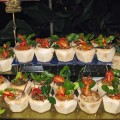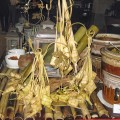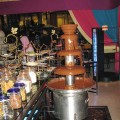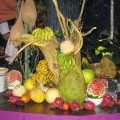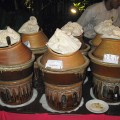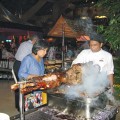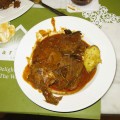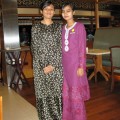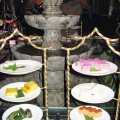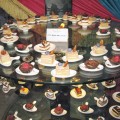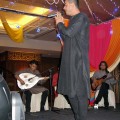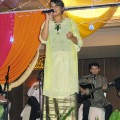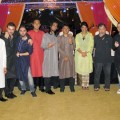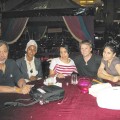Last Night in Kuala Lumpur
August 27, 2011
The capital city has been observing Ramadan. There’s fasting every day from sunrise to sundown. But at night, there is a celebration. Possibly it was a partly a business promotion, but the buffet at 7:30 pm in the Royale Chulan Hotel in the Golden Triangle was quite indulgent. It cost $100 a head although seniors were entitled to a 50% discount. There were at least 100 dishes, not including appetizers and desserts, from the cuisines of different ethnic and cultural groups — Malayan, Indonesian, Chinese, Arabic, Japanese — in the garden downstairs. Curry was a dominant flavor, but there was a whole lamb roasting in a pit, as well as seafood and vegies. There was a fountain dripping with chocolate in one corner of the premises. There were fruits in another. I focused on a wok of Malayan Fish Head Curry with Okra and Eggplant. I had cooked it a few times since the late 70s. There was a small ensemble playing Middle Eastern instruments and singing on the stage. I have been to Egypt before, a few times, and to Istanbul, Turkey and northern Cyprus, but I did not really know about Ramadan even if my Muslim friends talked and wrote about it to me. Realizing my ignorance about this sacred rite, I tried to read up on the festival that is celebrated in the Muslim world of which I know nothing much. If only for this late discovery, the travel to KL is worth all the money and effort. I have noticed a few signs in the buildings around town and notices on TV that August 29/Monday will be a celebration of Hari Raya at the end of Ramadan. I had seen this in the Philippines before and did not know what it meant. Here is part of what I found on the internet. Sorry, I do not know who wrote it.
QUOTE UNQUOTE FROM THE INTERNET
This article over is essentially information about Ramadan and Eid ul-Fitr as it applies to Malaysia.
Bold text==Literal Translation== I refute the literal translation of Hari Raya Aidilfitri as “Celebration Day of Fasting”. Aidilfitri is a transliteration of the Arabic term Eid ul-Fitr. Hari Raya is a translation of Eid ul-Fitr. However, this is not at literal translation. Hari Raya and Aidilfitri put together in one expression hence becomes a tautology. In an article about a Malay phenomenon we want the literal translation of the Malay part of the term, which is Hari Raya or possibly Hari Raya Puasa. We should not accept a literal translation of a transliteration from Arabic mixed with Malay. Here it is important to clarify what it is that is being literally translated. “Hari Raya Aidilfitri (also seen as Hari Raya Idul Fitri and Hari Raya Puasa, literally ‘Celebration Day of Fasting'” is not a clear sentence).
Eid is an Arabic word meaning “festivity”, while Fitr means “to break fast”. But the literal translation from Malay to English should be from the Malay translation of Eid ul-Fitr, not the transliteration.
The best literal translation of raya is big. It does not mean celebration or festivity. Sambutan is celebration or festivity according to Kamus Dwibahasa Oxford Fajar edisi keempat. Kamus Dwibahasa Oxford Fajar translates raya only as a verb (merayakan) and defines it as celebrate. However, dictionaries in Malay language provide more nuance. Tesaurus Bahasa Melayu Dewan 1998, Kamus Pelajar and other Malay dictionaries defines raya only as an adjective meaning big (besar). Kamus Dewan Bahasa Edisi Tiga clarifies the misconception that can arise from the translation in Kamus Dwibahasa Oxford Fajar:
“merayakan memuliakan (memperingati, meramaikan) hari besar (hari peringatan, peristiwa penting, dll).” Loosely translated to English: merayakan to honour (and remember) a big day.
Meanwhile, as all other mono-lingual dictionaries, Kamus Dewan Bahasa Edisi Tiga defines raya as big (besar). So for anyone who understands Malay prefixes (imbuhan) it becomes clear that the translation of raya as celebrate is inappropriate. Merayakan certainly can be translated to celebrate but that is not the term we are translating. Raya in the context of Hari Raya or Hari Raya Puasa is clearly an adjective meaning big. This is why we can say berhari raya and merayakan hari raya.
End of quotation.
August 29, 2011, Manila, Philippines
After 5 days in Kuala Lumpur (KL to many people), I wanted to leave touristing behind. I wanted to sit down and relish the last few hours in this multi-ethnic city. My wake-up call for my flight was at 4:30. I wanted to carry some memories beyond the Petronas Twin Towers, the tallest buildings in the world at one point, and Chinatown. I had been up to the Batu Caves, sacred pilgrimage of Hindus, but I wanted an appropriate closure to Ramadan, the Muslim high holy day/holiday. I went to the courtyard at about 10 when the feast was winding down. The place was almost deserted, except for the workers cleaning up and the musicians putting their instruments away. I noticed these people seated at the next table in front of the stage listening to the Middle Eastern ensemble playing music. I was writing a postcard to a friend when I thought of writing “Inshallah” but was not sure how. I asked them if they knew it in Arabic. The dark woman wrote the transliteration: In sha Allah. The woman next to her left wrote: In Sha-a Allah. Three words, five syllables, she said. And then she wrote the Arabic script/character on the postcard. The man to her left was her boyfriend. The woman on the extreme right was the wife of a singer. I went backstage to take photos of the musicians. They asked me to pose with them instead. It was a night to remember: the sound of Arabia drifting in the night in Kuala Lumpur like the scent of desert a flower and the laughter of beautiful Muslim women breaking the stillness. I went up to my hotel room and could not sleep again until past midnight.
My correspondence with Amira, my wonderful Egyptian friend follows:
Dear Rene,
I remember writing to you on more than one occasion about Ramadan. It is a very special time spiritually. It is said that the bad spirits and devils are in chains. The energy of the whole month — not just parts of the day — is supposedly ultra-violet – which is the most spiritual colour. The fasting is meant to teach you patience and compassion for the hungry and to leave you purified, but most people eat too much after sunset which defeats the purpose of the fast.
When we’ve chatted in the last few weeks and I’ve told you that I am preparing or eating my midnight meal, it has been because I am fasting so at around 12:30. My mother (who is staying with me) and I eat a light meal of fruit and yoghurt before we go to bed. (Some people eat more substantial meals but I worry about getting indigestion or becoming thirsty.) Then I wake up again at 3:30 or 3:45 to pray and meditate till dawn, then pray again at dawn and go back to bed at around 4ish. And hopefully to sleep in late. Some people just stay awake till dawn prayers and then sleep in which case they will eat later in the night like at 2 or 3. I can’t keep going that long and prefer to sleep even for an hour before waking up for predawn and dawn prayers. I am always out on the terrace at this time and the stars and moon are fabulous and the air is so fresh and the flowers smell so sweet. It is my favourite time of the day.
The Eid is a celebration of the end of the fast which can be 29 or 30 days depending on the moon. They say it will be 30 days this year which means the Eid will be on Wednesday the 31st. People are out in the street the night it is announced joyously celebrating the end of the fast. It really wears you down by the end of the month and there is nothing nicer than waking up on Eid morning and having a cup of tea! Children wear new clothes and are given small gifts of money. Everyone gets money gifts in fact – called Eidiya – employees, children, poor people in the streets and so on. At 7 am there is a special Eid prayer with a beautiful chant that everyone sings together.
Well, enjoy the rest of your holiday. Have a great time in Manila and Taiwan and please send me a post card from Taroko Gorge (if you can)!
Amira x
Dear Amira,
Excerpt:
Fish head curry with some bao (Chinese bread) was practically all I had, except for the marang, jackfruit and lychees. I walked around the courtyard and checked out the food. A lot of curry-based food: chicken (a few pots of it from different countries), lamb, and fish. There was even a version of it from Kazakstan! It did not make much sense to eat meat at the time. I had a taste of the grilled lamb but it did not taste good without any sauce. And the roasted goat did not taste any better. I was eager to try different dishes but my mouth wasn’t ready for anything else.
Rene
Dear Rene,
Excerpt:
The problem with large buffet dinners is that you want to taste everything and you end up eating far too much! Even with a small taste of each dish it is a lot – but it is fun … Whole roast lamb or goat does look very impressive especially when they are placed on enormous platters of rice cooked with nuts and raisins. But I don’t eat lamb or goat so that’s two things less for me to taste!
It is 3 words: In Shaa Allah. In=If – Shaa= Wills – Allah= God.
I forgot to tell you the reason why my fave part of the day is when I am up in the small hours waiting for the dawn prayers. It’s because I hear all the different calls to prayer chanting at the same time from all the mosques around. Each guy has a slightly different style – a different voice – a different tempo – a different music, and it all just harmonizes wonderfully together in the night air against the backdrop of stars and moon and the smell of the flowers. It is very beautiful and moving…
Enjoy your time in Manila. I am sure it is always nice to go home and see old friends and family.
Love,
Amira
